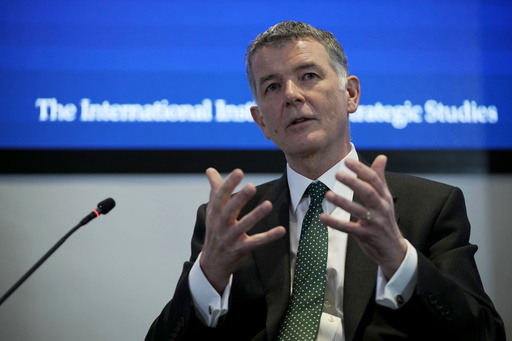
PARIS — The director of Britain’s foreign intelligence agency recently highlighted the alarming sabotage operations that Russia is allegedly executing against Ukraine’s Western allies, describing these actions as “staggeringly reckless.” He emphasized that agencies such as MI6 and their French counterpart are diligently working to manage the situation before it escalates further.
During a speech delivered to diplomats and intelligence personnel in France, MI6 chief Richard Moore pointed out that both intelligence organizations are collaborating to assess potential risks and guide their governments’ responses amidst the aggressive posturing and rhetoric from President Vladimir Putin. Moore expressed concern over Russia’s provocations, including frightening threats surrounding nuclear capabilities aimed at deterring support for Ukraine.
Moore detailed his findings of an alarming campaign launched by Russian operatives within Europe focused on sabotage while asserting that such tactics come hand-in-hand with dangerous rhetoric. He categorized these endeavors as extremely irresponsible and reckless. He shared the stage with Nicolas Lerner, the leading figure of France’s external intelligence agency, the DGSE, during a ceremony commemorating the 120th anniversary of the Entente Cordiale—a historic agreement uniting Britain and France as military and diplomatic partners.
Western officials are increasingly alarmed by the potential of Russian intelligence efforts to undermine Ukraine’s allies, employing disinformation, sabotage, and acts of arson as their strategies. Reports have surfaced linking Moscow to various planned attacks across Europe, including a supposed scheme to destroy businesses owned by Ukrainians in London and threats involving incendiary devices shipped via cargo planes. Recent incidents involved a fire at a courier hub in Germany and another breakout in a warehouse in England, both linked to these devices.
Lerner echoed Moore’s concerns regarding the collective security of Europe being deeply intertwined with the situation in Ukraine. He noted that Britain’s approach to addressing threats from Russia, particularly following serious incidents like the Novichok poisoning in Salisbury in 2018, has provided valuable insights for French intelligence as it seeks to mitigate Russian aggression.
Both Britain and France have been at the forefront of aiding Ukraine, permitting the deployment of supplied weaponry—including missiles known as Scalp in France and Storm Shadow in Britain—against targets situated within Russia’s borders. Recently, the Biden administration has softened its previous stance against U.S.-made missiles being used for strikes on Russian soil, and Ukraine announced its first successful use of U.S. ATACM missiles against Russian targets last week.
In retaliation, Russia has launched extensive attacks on Ukraine’s energy infrastructure, utilizing hundreds of missiles and drones. President Putin declared that these strikes were a direct response to Ukraine’s offensive actions against Russia using American missile systems. Additionally, Russia unveiled a new intermediate-range ballistic missile called Oreshnik, with Putin warning that it could be deployed against strategic centers in Kyiv, Ukraine’s capital.
In a cautious reminder to allies hesitant about their support for Ukraine, Moore stressed the known expenses associated with backing Ukraine against Russian advances, asserting that the ramifications of inaction would be far more severe. He warned that should Russia triumph, both Iran and China—who currently maintain a transactional relationship with Moscow—might strengthen their ties with Russia.
Moore articulated a dire potential scenario: “If Putin succeeds, China would evaluate the fallout, North Korea would feel empowered, and Iran could become even more hazardous.”
